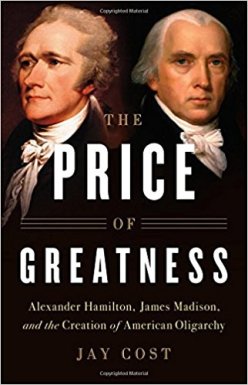Jay Cost is a Visiting Scholar at the American Enterprise Institute, a columnist at National Review Online, and a contributing editorial writer to the Pittsburgh Post-Gazette.
He is the author of three books, most recently The Price of Greatness: Alexander Hamilton, James Madison, and the Creation of American Oligarchy.
About the Book
Like fashion, American political biography is notoriously faddish. With the exception of a few hardy perennials like Lincoln and Washington, historical figures often fall in and out of favor with biographers. Lately, much attention has been paid to Alexander Hamilton and James Madison. Hamilton was the subject of a widely acclaimed biography which reintroduced the first secretary of the treasury to Americans and inspired an award-winning Broadway hit. There will probably never be a musical written about Madison, a quiet, diminutive planter from Virginia, but he has also enjoyed a renaissance and has been the subject of many scholarly treatments in recent years.
In THE PRICE OF GREATNESS: Alexander Hamilton, James Madison, and the Creation of American Oligarchy (Basic Books, June 5, 2018), Jay Cost argues that this renewed interest in the duo is richly deserved at a time when the battles over the meaning of the founding are more intense than ever. Yet despite the recent revival, little has been written about the relationship between Madison and Hamilton. Cost argues that we cannot understand either man, or their legacies, without first understanding that relationship—and, in particular, their famous falling out.
As Cost shows, not only were Madison and Hamilton central actors in the early years of the new republic, but their stories are inseparable. Though they were close allies and even friends in the 1780s, they became bitter rivals in the 1790s. After the project of framing a new government was finally completed, they turned on each other, and their dispute led to the first partisan political divide in our country. What happened? And more important, what does their falling-out tell us about the Constitution, our government, and our politics? More than two hundred years later, these questions continue to linger.
Cost contends that Madison and Hamilton’s tumultuous relationship can be explained by how each understood their commitment to republican nationalism—the idea that the new country should be a true union of the states founded on republican principles. While they both viewed the Constitution as a step in the right direction, they had divergent ideas of how policy could advance their broader goal. Hamilton emphasized a program of economic vigor, whereby the wealthy received direct benefits from the government that over time would strengthen the union and thus redound to the benefit of all citizens. Madison, on the other hand, insisted on balance, so that each faction was treated fairly and that power was evenly distributed among citizens of the new nation. This tension was latent in the 1780s, when the two worked together to draft a new Constitution, but became active in the 1790s as matters like trade and finance became the dominant issues.
Madison’s critique of Hamilton’s program had merit—it was unfair in many respects, and it facilitated political corruption. But he overlooked the need to need to develop the young nation’s economic might. After the nearly calamitous War of 1812, when the country’s incapacity was laid bare, he adopted much of the old Hamiltonian system—and the original problems of partiality and corruption were manifest once again. Ultimately, neither found a way to deliver the kind of political vision that was consistent with the ideal embedded in the Constitution—a program to cohere and strengthen the union while remaining faithful to republican principles.
An essential new account of the origins of our politics, THE PRICE OF GREATNESS reveals the tradeoff that made America the most powerful nation the world has ever seen, and that continues to shape our fractured politics to this day.
What people are saying
“Thoughtful people differ concerning why so many of today’s most talented writers on American history practice their craft outside academia. Thoughtful people agree, and this book demonstrates, that Jay Cost is among those writers. He offers fascinating insight into the still-reverberating rivalry between Madison and Hamilton, and sobering reasons for heeding Madison’s warning that government can ‘support a real domination of the few, under an apparent liberty of the many.’”
—George F. Will, Washington Post columnist
“Jay Cost brings alive the profound dispute between Madison’s republicanism and Hamilton’s nationalism and helps us see why it still matters. At once a discerning scholar of political theory and a perceptive student of political practice, he is the perfect guide to this rich story.”
—Yuval Levin, author of The Fractured Republic and editor of National Affairs
“In his lively new book, Jay Cost continues his fascinating inquiry into the sources of American political corruption by examining Alexander Hamilton’s and James Madison’s divergent understandings of the Constitution and the proper balancing of liberty, republicanism, and national unity and prosperity.”
—Bradford Wilson, executive director, James Madison Program, Princeton University
“Jay Cost has managed to do the unthinkable. He’s written an insightful account of the principles and practices of two great founding fathers, Alexander Hamilton and James Madison, without savaging one or the other. This terrific book is destined to reshape our thinking about the key events of the early republic including the tragic break between Hamilton and Madison, one of the most significant schisms in American history. A must-read for those interested in a deeper understanding of two giants whose principles animate America’s conflicted soul.”
—Stephen F. Knott, author of Alexander Hamilton and the Persistence of Myth

